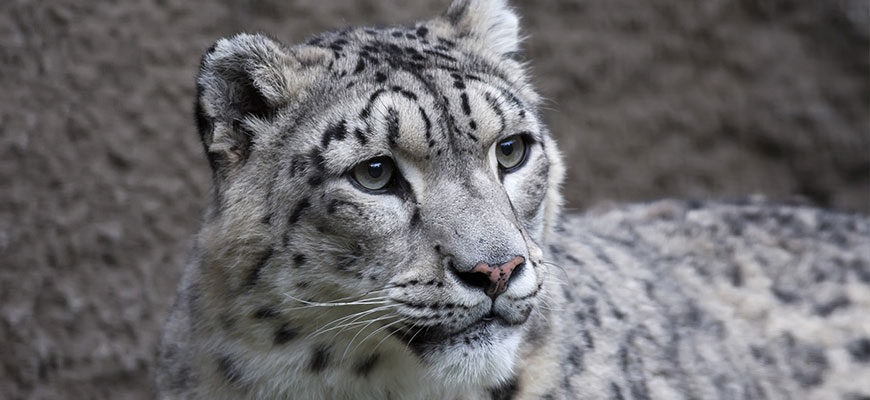CONTACT: Kyle Shepherd
502-238-5331 (Media Cell 502-744-5639)
kyle.shepherd@louisvilleky.gov
LOUISVILLE, Ky. (December 11, 2020) – Five-year- old NeeCee, a female snow leopard at the Louisville Zoo, has tested positive for SARS-CoV-2, the virus that causes COVID-19 in humans. The Zoo is awaiting confirmatory results of the other two male snow leopards – Kimti and Meru. All three cats are doing well with very mild symptoms, and the Zoo continues to monitor their health closely. The Zoo anticipates continued improvement in the coming days, and all three cats are expected to recover. No other animals are showing symptoms at this time.
Based on current knowledge, the risk of infected animals, including this snow leopard, spreading the virus to humans is considered low. COVID-19 remains predominantly a disease transmitted from person to person. The Zoo initiated all necessary safety precautions and public health inspections before re-opening last spring and remains open throughout the winter.
Senior staff veterinarian Dr. Zoli Gyimesi met with the keeper staff who care for the cats to establish additional precautions when caring for the snow leopards. This includes enhanced personal protective equipment (PPE). All Zoo staff are following COVID-19 safety protocols recommended by the Centers for Disease Control and Prevention (CDC) and Louisville Metro Health and Wellness. The snow leopards are off exhibit while NeeCee recovers and while the Zoo awaits the confirmatory results on the remaining two snow leopards.
The three snow leopards began exhibiting minor respiratory symptoms, including an occasional dry cough or wheeze, within the last two weeks. It is suspected that NeeCee acquired the infection from an asymptomatic staff member, despite precautions by the Zoo. The snow leopards were tested for SARS-CoV-2 infection with approval by state officials from the Kentucky Department of Agriculture and the Kentucky Department for Public Health. In April, Zoo keepers working with cats, non-human primates, bats and ferrets began wearing PPE when near the animals. All Zoo staff go through a health screening at the start of their day, stay at home if feeling unwell and are tested if symptoms of COVID-19 arise.
“Fortunately, based on clinical cases in large cats at other zoos in the country to this point, SARS-CoV-2 infection does not appear to be life-threatening,” says Dr. Gyimesi. “We will be closely monitoring the snow leopards for ongoing symptoms and resampling them to identify when they have cleared the infection.”
Fecal samples from all three cats were sent to the Veterinary Diagnostic Laboratory at the University of Illinois, College of Veterinary Medicine on Friday, Dec. 4, 2020. Due to mild symptoms, the Zoo elected to test feces rather than anesthetize the cats for more invasive diagnostics.
Initial polymerase chain reaction (PCR) testing was conducted Monday, Dec. 7. A positive result at a regional lab is presumptive until it can be confirmed at the USDA National Veterinary Services Laboratories in Ames, Iowa. The presumptive positive samples were therefore forwarded to the federal animal diagnostic lab for confirmatory testing and produced this finding.
This is the first confirmed case of SARS-CoV-2 infection in a snow leopard. This discovery contributes to the growing knowledge about this novel coronavirus and transmission between people and animals.
In April 2020, four tigers and three lions were confirmed positive at an Association of Zoos and Aquariums (AZA) zoo in New York. An additional three tigers at an AZA zoo in Tennessee were confirmed to be infected this fall. In all cases, the animals recovered and are doing well. As recently as this week, a Zoo in Spain reported four lions testing positive.
The USDA keeps a list of confirmed cases in animals, and in Kentucky to date, there has been one confirmed case of SARS-CoV-2 in a domestic cat. For more information on how to prevent COVID-19 in people and animals, visit the CDC webpage.
“We would like to thank everyone for their help and support, including the University of Illinois, College of Veterinary Medicine Veterinary Diagnostic Laboratory; USDA National Veterinary Services Laboratories, Kentucky Department of Agriculture, Kentucky Department for Public Health, Louisville Metro Health and Wellness and the CDC,” said Zoo Director John Walczak. “We are thankful for our dedicated keeper and animal health staff whose care and observations led to the diagnosis of NeeCee.”
About the Louisville Zoo
The Louisville Zoo, a nonprofit organization and state zoo of Kentucky, is dedicated to bettering the bond between people and our planet by providing excellent care for animals, a great experience for visitors, and leadership in scientific research and conservation education. The Zoo is accredited by the Association of Zoos and Aquariums (AZA).
# # #
More info at LouisvilleZoo.org/catcare

